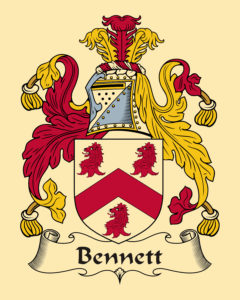We sell our products exclusively on Amazon so you can buy with confidence knowing you are protected by Amazons no hassle return policy and our 4.9 star lifetime seller rating with over 2000 reviews. Items featuring a family crest make great gifts, whether for yourself or that hard to buy for family member, friend or co-worker.
We sell Mugs, Plaques, Prints, Ceramic Tiles, Coasters, Garden Flags, License Plates and Mouse Pads featuring The Barton Coat of Arms. Click the image to go to Anglo/Irish names A section of our Amazon store.
We also sell customized license plates (add your own image and text). customizable mugs and license plates for military veterans, classic art on mouse pads and posters, a wide variety of flag license plates for nations around the world as well as pride flags and Native American tribal flags. Click here to go to our Amazon Store front.
The surname Bennett is an Anglo-Irish-Scottish name with deep historical roots, derived from the medieval given name “Benedict,” which means “blessed” in Latin (“Benedictus”). The popularity of this name surged after St. Benedict of Nursia, the 6th-century founder of the Benedictine monastic order. Over time, the name evolved into various forms in different regions, giving rise to the surname Bennett and its numerous variations.
Etymology and Origin
Latin Roots and Evolution

The name Benedictus, meaning “blessed,” was a favored Christian name during the Middle Ages, often given to children as a mark of devotion or hope for divine favor. The name spread widely across Europe, particularly in the regions influenced by Roman Catholicism. The Normans introduced the name Benedict to England after the Norman Conquest in 1066, where it began to take on various forms, including Bennet, Bennatt, and eventually Bennett.
Earliest Recorded Use in England
In England, the surname Bennett first appeared in records in the 12th century. The earliest recorded instance of the name is found in the Domesday Book of 1086, where a “Benedictus” is mentioned. By the 13th century, the name had begun to morph into its current form. A notable early recording is that of “Thomas Bennet” in the Hundred Rolls of Cambridgeshire in 1273. The Bennett surname became more common during the Middle Ages, particularly in southern England, as the given name Benedict was often shortened to Benet or Bennet.
Earliest Recorded Use in Scotland
In Scotland, the surname Bennett has a similarly ancient lineage. The first recorded use of the name in Scotland appears in the early 14th century. The Ragman Rolls of 1296, a collection of documents where Scottish landowners swore fealty to King Edward I of England, mention a “Henricus Benet.” Over time, the Bennett surname became more established, particularly in the Lowlands and Borders regions, where the influence of English and Norman culture was strong.
Earliest Recorded Use in Ireland
The Bennett surname also found its way to Ireland, primarily through the Anglo-Norman invasion of the 12th century. The Anglo-Normans brought with them many surnames of English and Norman origin, and Bennett was among them. The name became established in Ireland, particularly in the Pale, the region around Dublin, and later spread to other parts of the country. The earliest recorded instance in Ireland dates back to the 14th century, with records showing the name in counties Kilkenny and Wexford. The Bennetts in Ireland were often associated with the Protestant Ascendancy, although over time, the name became more widespread among the Catholic population as well.
Earliest Recorded Use in the United States
The Bennett surname was brought to the United States by early English and Scottish settlers during the colonial period. One of the earliest recorded instances of the name in America is that of Richard Bennett, who emigrated from England to Virginia in the early 17th century. Richard Bennett became a prominent figure in the Virginia Colony, serving as Governor of Virginia from 1652 to 1655. The Bennett name spread across the American colonies, becoming especially common in the southern states and New England. Over time, Bennetts became prominent in various aspects of American life, contributing to politics, commerce, and the military.
Spelling Variations
The Bennett surname, like many others, has undergone numerous spelling variations over the centuries. These variations often arose due to differences in regional dialects, literacy levels, and the transcription practices of clerks and record keepers. Some common variations include:
Bennet, Bennatt, Benet, Benett, Bennitt, Benetts, Benettus, Benneth, Benyett, Benedict
These variations often appeared in historical records, sometimes even within the same family line, reflecting the fluid nature of surname spelling before standardized forms became widespread.
Conclusion
The surname Bennett has a rich history, tracing back to the Latin “Benedictus” and spreading across England, Scotland, Ireland, and eventually the United States. The name’s journey through time reflects broader patterns of migration, cultural influence, and linguistic change. Today, Bennett remains a common surname in the English-speaking world, with its various spellings serving as a testament to its long and varied history.